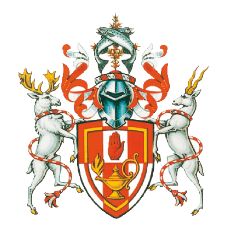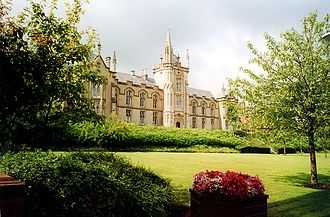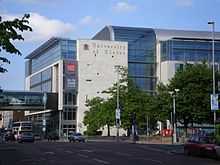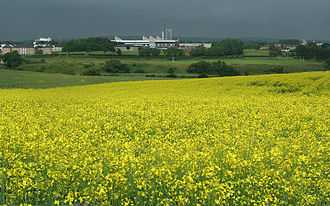Ulster University
| Ulster University | |
|---|---|
|
Irish: Ollscoil Uladh Scots: Ulstèr Universitie | |
|
Ulster University's coat of arms | |
Former names |
University of Ulster, New University of Ulster |
| Motto | No motto[1] |
| Established |
1865 - Magee College 1953 - Magee University 1969 - New University of Ulster 1982 - University of Ulster 2014 - Ulster University |
| Type | Public research university |
| Endowment | £4.764 million (2013)[2] |
| Budget | £12m |
| Chancellor | James Nesbitt[3] |
| Vice-Chancellor | Sir Richard Barnett |
Academic staff | 1,114 |
| Students | 26,460 (2014/15)[4] |
| Undergraduates | 20,655[4] |
| Postgraduates | 5,800[4] |
| Location |
|
| Campus |
Varied
|
| Colours |
Logo:Navy & Bronze Seal:Red & Gold Formerly:Navy, Blue & Green |
| Affiliations |
EUA ACU UUK UI |
| Website |
www |
 | |
Ulster University (shortened to UU; Irish: Ollscoil Uladh,[5][6][7] Ulster Scots: Ulstèr Universitie[8] or Ulstèr Varsitie)[9] is a multi-campus, co-educational university located in Northern Ireland. It is the second largest university in Ireland, after the federal National University of Ireland. The university was established in 1968 as the New University of Ulster, merged with Ulster Polytechnic in 1984, and can trace its roots back to 1845 when Magee College was endowed in Londonderry, and 1849, when the School of Art and Design was inaugurated in Belfast. The University held the name University of Ulster for a number of years before rebranding itself in October 2014 as Ulster University (UU).
The university incorporated its four campuses in 1984 under the University of Ulster banner; these are located in Belfast, Coleraine (site of the administrative headquarters), Magee College in Derry, and Jordanstown. A fifth distance learning campus, Campus One, delivers online programmes; mainly at graduate level.
Ulster is a member of the Association of Commonwealth Universities,[10] the European University Association, Universities Ireland and Universities UK.
The university has one of the highest further study and/or employment rates in the UK, with 95% of graduates being in work or undertaking further study six months after they have completed their degree.[11] In the 2008 RAE 86% of research activity at the university was rated as being of international quality, with 20% being classified as world-leading. Of particular note are the submissions within Biomedical Sciences, the Institute of Nursing and Health Research[12] and Celtic Studies which were all ranked within the top three UK universities[11]
The Research Excellence Framework 2014 exercise identified Ulster University as one of the top five universities in the UK for world-leading research in law, biomedical sciences, nursing and art and design; under some metrics, it ranked Ulster University top in Northern Ireland for research into biomedical sciences, law, business and management, architecture and built environment, art and design, social policy, sport, media studies and nursing.[13]
History
The New University of Ulster (NUU) incorporated Magee College founded in 1865 in Londonderry. Magee College was a college of the Royal University of Ireland from 1880 and later became associated with the University of Dublin (better known as Trinity College) when the Royal University was dissolved in 1908 and replaced by the National University of Ireland. In 1953 Magee College broke its links with Dublin and became Magee University College. It was hoped by groups led by the University for Londonderry Committee that this university college would become Northern Ireland's second university after The Queen's University of Belfast. However, this did not happen and instead it was subsumed into the New University, primarily as a result of the unwillingness of the Unionist government at Stormont to have the second university sited in overwhelmingly nationalist Londonderry, in which "The Troubles" were just beginning to break out. The decision caused an outcry at the time.[14]
The university was built at Coleraine as part of Her Majesty's Government's expansion of higher education in the 1960s. Coleraine today is the university's headquarters and main campus. Following a review of higher education in Northern Ireland under the chairmanship of Sir Henry Chilver in 1982 the direct-rule government decided to merge NUU with the Ulster Polytechnic to form the University of Ulster (dropping "New" from the name.) The merger took effect on 1 October 1984. This was the first, and as of 2010, only merger in UK higher education whereby what is now called a plate glass university merged with what would now be a post-1992 university.
There was a high demand for places in 2004–05, contributing to a record number of applications to keep the University of Ulster in the top 10 of the UK's most popular universities.[15] Ulster was shortlisted for the Sunday Times University of the Year award in 2001. In the field of biomedical sciences, the university obtained a 5* rating, as well as being ranked joint first in the UK, following the Research Assessment Exercises in 1996 and 2001.
Financial restructuring
In autumn 2011 Vice-Chancellor Barnett announced a programme of financial restructuring with the aim of reducing the number of staff employed by the University from 3,150 to 3,000.[16] Staff at the University expressed concern about the proposed means and impact of the restructuring, citing "the use of the threat of compulsory redundancy to bully and intimidate staff" [17] and the belief that the University was "abdicating its responsibilities to the wider community that funds it".[18] It is that an indirect result of this is that the University's rank began to fall.
In April 2012, the UU branch of the University and College Union (UCU) declared a formal dispute with university management over its implementation of the restructuring, stating that the recourse to "premature deadlines and unwarranted threats of compulsory redundancy" was "unreasonable as well as contrary to University policy and corporate goals".[19]
Rebranding
In preparation for the 2015–2018 expansion of the Belfast campus, the university underwent a re-branding in October 2014. This update changed the University's name to Ulster University and appropriately changed the logo to suit.
Academic profile
The university's course provision is the largest in Northern Ireland, covering arts, business, engineering, information technology, life and health sciences, management, and social sciences. Courses have a strong vocational element and the majority include a period of industrial or professional placement.
The university has a strong reputation for innovation. In order to create new pathways into higher education Ulster University initiated its Online Distance Learning (ODL) project called Campus One. The Campus One programme provides an alternative mode of study, with a range of courses available online to students all over the world. Campus One courses range from full postgraduate programmes, professional development and continuing development courses; through to short business-focused courses all offered over the Internet.
The university contributes a higher than national average to local research and development activity and has a strategic research focus. There is particularly strength in the field of biomedical sciences, and a Centre for Molecular Biosciences (located at Coleraine) is one of the major projects developed by the university. The Biomedical Sciences department obtained the highest possible 5* rating as well as being joint first in the UK, following the UK – wide Research Assessment Exercise (RAE) in 1996. It was the only UK university to retain a 5* rating for biomedical sciences in the 2001 RAE - part of a performance that saw significant improvement and consolidation of the 1996 results. A 5* research rating was also awarded in the field of Celtic studies. The university performed well in the 2008 RAE.[20]
Headline findings for Ulster University in the Research Excellence Framework 2014 include: in the top 25 per cent of all UK universities; in the top 10 UK-wide for built environment, biomedical sciences, law, art and design and nursing research; Second in the UK for Celtic Studies research; top in Northern Ireland for the overall impact of its world-leading research; Top in Northern Ireland for research into biomedical sciences, law, business and management, architecture and built environment, art and design, social policy, sport, media studies and nursing.[13]
The university is a leading partner in the Northern Ireland Science Park development, with Science Park sites at the Coleraine and Magee campuses, and in Belfast. There are also Innovation Centres at Coleraine and Magee which provide incubation support to developing 'spin-out' and 'spin-in' companies.
Ranking
The university is ranked annually by the Complete University Guide, The Guardian, and jointly by The Times and The Sunday Times; this makes up the UK University League Table rankings. The University has a history of variable and rather sporadic rankings which change much year on year. It is thought that this is due to the cessation in growth the university had possessed before the credit crunch, after which major financial cutbacks restricted spending. In addition, the university has traditionally accepted lower achieving students in a number of subjects which further contributes to the lowering of the university ranking. It is anticipated that the University's rank will begin to rise with the future expansion of its Belfast campus. However, this is still speculative. In spite of its falling rank the university has consistently held a number of top ten and number one ranked subjects.[21] In 2001 the university was short-listed by the Sunday Times as The Sunday Times' University of the Year.
| Publication | 2008 | 2009 | 2010 | 2011 | 2012 | 2013 | 2014 | 2015 |
|---|---|---|---|---|---|---|---|---|
| The Complete University Guide | 54[22] | 51[22] | 51[22] | 54[22] | 52[22] | 60[22] | 74[22] | 84[22] |
| The Guardian | 97[23] | 93[23] | ||||||
| The Sunday Times/The Times |
Campuses
The university currently maintains four sites in Northern Ireland, as well as one online site and two branch campuses in each of London and Birmingham. In February 2009 the university announced the movement of many courses from the Jordanstown campus to the main Belfast campus and a consolidation of student numbers at Coleraine and the reuse of university grounds for a business park.[24] Campus One is not a physical location and is the online education facility of the university.
| ||||||||||
| Top to Bottom, left to right: Magee College, 2006; Belfast Campus main building, 2008; Belfast Campus arts building, 2010; Jordanstown Campus Library Exterior, 2015; Jordanstown Campus Foyer Interior, 2015; Jordanstown Campus Health Sciences Building, 2015; Jordanstown Campus Engineering Village, 2015; Coleraine Campus, 2007; Coleraine Campus Main Building, 2006; Magee College, 2005. |
Coleraine
The Coleraine campus (UUC) is the administration headquarters of the University and is the most traditional in outlook, with a focus on science and the humanities. The traditional focus is primarily as a result of it always being a university campus as opposed to the more vocational type courses offered at the polytechnic at Jordanstown. The internationally acclaimed School of Biomedical Science is based at Coleraine, as is the Northern Ireland Centre for Food and Health (NICHE). The Coleraine campus also hosts the only optometry school in Northern Ireland.
The Coleraine campus includes the Riverside Theatre, the third-largest professional theatre in Northern Ireland.
In 2009 the University launched a new Master of Pharmacy (MPharm) course at Coleraine.
In July 2011, in cooperation with Zhejiang University of Media and Communications (ZUMC), 'The Confucius Institute at the University of Ulster' (CIUU) was developed. The Confucius Institute is part of a network of 322 institutes in over 50 countries which promote and teach Chinese language and culture and facilitate cultural exchanges aimed at fostering trade links with China.[25] The campus is situated on the banks of the River Bann with views to the North Coast and County Donegal hills.
Portrush
The Portrush site was part of the Coleraine Campus and home to the School of Hotel, Leisure and Tourism. Portrush is a town east of Coleraine on the North Coast of Northern Ireland. The site closed in 2008 and courses were relocated to the Coleraine and the newly developed Belfast campuses.
Jordanstown

The Jordanstown campus (UUJ) is located in Jordanstown, 7 miles outside Belfast and concentrates on engineering, health and social science, and is the home of the Ulster Business School. The 114-acre (0.46 km2) Jordanstown campus is set in a suburb approximately seven miles (11 km) from Belfast city centre and situated at the foot of the Antrim Hills overlooking Belfast Lough. The buildings are mostly situated around a central mall with on-site stores and services.
Jordanstown is home to the Sports Institute for Northern Ireland and has a range of sports facilities including a modern, high performance training facility. The Transitional Justice Institute is based in Jordanstown at Dalriada House.
Jordanstown hosts a very prominent and research intensive array of allied health profession degree programs. These programs generally have higher academic entrance requirements due to the lesser number of allocated places on the programs. Allied Healthcare Profession programs include Clinical Physiology, Diagnostic Radiography, Healthcare Science, Occupational Therapy, Physiotherapy, Podiatry, Speech and Language Therapy and Therapeutic Radiography.
Several other renowned programs include Communication Advertising and Marketing (CAM), Law, Quantity Surveying and Sport and Exercise Science.
Magee
The Magee campus (UUM) in the city of Derry is a mixture of historic and new buildings in a Victorian residential area. It was named after Martha Magee and opened in 1865 as a Presbyterian Christian arts and theological college.[26] Since 1953, it has had no religious affiliation, and was one of the founding campuses of the university in 1968. As of 2014, it provides a broad range of undergraduate and postgraduate degree programmes in disciplines ranging from computer science, computer games and robotics, drama, psychology and nursing, as well as hosting research centres such as the Intelligent Systems Research Centre.[27] The campus is within walking distance of the shopping and entertainment districts and is serviced by transport links. From 1984 to the early 21st century, development of the university focused on the expansion of the Magee campus.[26]
Belfast
The Belfast campus is the home of the University’s Belfast School of Art, founded in 1849 and completed major redevelopment in 2008. The building is situated in the Cathedral Quarter of the City.
Southern Belfast is where most student accommodations are found. Students at the Belfast campus can use the recreation facilities at the larger Jordanstown campus. Transportation between the two sites is quick and frequent. Total enrolment: 1,100 students.
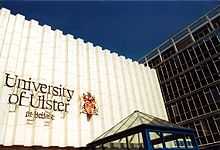
The Ulster Law Clinic is based in the Belfast campus.
Ballymaguigan
The university formerly had a laboratory named ‘The University of Ulster Freshwater Laboratory’ on the shore of Lough Neagh in Ballymaguigan; Ballyronan is outside the town of Magherafelt in County Londonderry. The Freshwater Laboratory, although not a campus was a base of the university and consisted of on-campus accommodation, classrooms and testing labs.
Courses offered were in agriculture, the wildlife of Lough Neagh, water testing and other aquatic courses. The base closed around the turn of the 21st century, and though still standing as of 2010, is in a run down state and now owned by Magherafelt District Council. By 2010, the area had become popular with the locals for camping, fishing and sailing.
Branch Campuses
The university has two branches in England: London and Birmingham. The London campus is in Holborn, and the Birmingham facility is in the Centre City Tower.[29][30] They offer courses in business, finance and computing.[31]
Organisation and governance
The faculties of the university (and the dean of each faculty listed after), are:
- Faculty of Arts, Jan Jedrzejewski
- Faculty of Art, Design and the Built Environment, Ian Montgomery
- Faculty of Computing and Engineering, Richard Millar
- Faculty of Life and Health Sciences, Carol Curran
- Faculty of Social Sciences, Paul Carmichael
- Ulster Business School, Marie McHugh
Governance
- Vice-Chancellors
- Sir Derek Birley (1983–1991)
- Trevor Arthur Smith, Baron Smith of Clifton (1991–1999)
- P G (Gerry) McKenna DL MRIA (1999–2005)[32]
- Sir Richard Barnett (2006 – present)
- Chancellor
- James Nesbitt (2010-present)
Research
Institute of Nursing and Health Research
The Institute of Nursing and Health Research is based at Ulster. In the RAE process in 2008, the Institute of Nursing Research (INR) was ranked among the premier league of UK universities while 40% of its research was classed as ‘world leading. Nursing at Ulster was also ranked among the top of universities in the UK and in terms of 4* research, within the top three universities.
Within the Institute, there is a culture of research and scholarship with over thirty researchers and ten professors based on the Jordanstown, Coleraine and Magee campuses of the university. The Institute has four main centres which focus on the following themes:[33]
- Managing Chronic Illness, which conducts rigorous research into holistic care, responsive to the needs of those living with a chronic condition.
- Person-Centred Practice, which focuses on the enhancement of knowledge and expertise in person centred practice
- Maternal, Fetal and Infant Research, which encompasses two main research clusters: perinatal epidemiology and midwifery research
- Intellectual and Developmental Disabilities, which initiates research and evaluation studies to inform the development and organisation of policy and services for people with disabilities.
Transitional Justice Institute
Ulster University's Transitional Justice Institute (TJI), is a research institute of Ulster University which is physically located at the Jordanstown and Magee campuses. The TJI undertakes world-leading research on transitional justice, conflict, international law, human rights and gender equality.
The TJI leads Ulster's Law submission for the Research Excellence Framework (REF). In REF 2014 Law at Ulster University was ranked 4th overall in the UK (based on GPA). As a result, 88 % of all work was deemed to be "internationally excellent or world leading". Concerning the new impact criterion, Law was ranked 1st in the UK, with 100% of impact rated as world-leading. In addition, 100% of research submitted was given an impact and environment rating of 3* or 4*.
Facilities
Campus One
Campus One, the Virtual Campus of the university, was launched on 8 October 2001.[34] It represents a revolutionary new route to learning via the World Wide Web and was selected by the European Commission to deliver the world's first Higher Educational Programme in Hydrogen Safety Engineering.[35]
It developed the world's first ever fully on-line Masters programme in biomedical sciences. Campus one is now referred to as e-Learning by the university.
Noted academics and alumni
Ulster has a large body of notable alumni, including MPs Kate Hoey, Gregory Campbell, Michelle Gildernew, Roberta Blackman-Woods and former deputy First Minister of Northern Ireland Mark Durkan, MLAs Alban Maginness, Basil McCrea and Seán Neeson, writers and authors including Anne Devlin, Colin Duriez and Aodán Mac Póilin, poets including Gerald Dawe and Brendan Hamill, and artists including Colin Davidson, Oliver Jeffers, Victor Sloan, Andre Stitt, John Luke and John Kindness. Other alumni include composer Brian Irvine, musician David Lyttle, comedian Omid Djalili, former hostage and writer Brian Keenan, historian Simon Kitson, biomedical scientist and former vice chancellor P G (Gerry) McKenna, filmmaker Brian Philip Davis, visual artist Willie Doherty, photographer Mary Fitzpatrick, film producer Michael Riley, rugby player Brian Robinson, radio and television personality Gerry Anderson, nursing academic Alison Kitson.
Notable academics who have worked at Ulster include historian Antony Alcock, political scientist Monica McWilliams, poets Andrew Waterman and James Simmons, literary critic Walter Allen, physicist and subsequently Vice-Chancellor of the University of Sheffield, Gareth Roberts, mathematician Ralph Henstock, solar energy technologist and President of Dublin Institute of Technology, Brian Norton, law professors Brice Dickson and Denis Moloney, Professor of Nursing Research Brendan McCormack. Turner Prize-nominated video artist Willie Doherty, Official War Artist Paul Seawright and live artist Anne Seagrave.
Academics who were elected to Membership of the Royal Irish Academy while based at Ulster include, Bertie Ussher (Classics), Norman Gibson (Economics), Amyan Macfadyen (Biology), Bill Watts (Chemistry), P G (Gerry) McKenna (Biomedical Sciences, Genetics), Sean Strain (Biomedical Sciences, Nutrition), Marshall McCabe (Geology), Peter Flatt (Biomedical Sciences, Diabetes), Séamus MacMathúna (Celtic Studies), Robert Anthony Welch (Literature), Vani Borooah (Economics), Máréaid Nic Craith (Celtic Studies), Graham Gargett (French), Helene McNulty (Biomedical Sciences, Nutrition), Pól Ó Dochartaigh (German), Robert McBride (French), Ullrich Kockel (ethnography), John McCloskey (Geosciences), and Rosalind Pritchard (Education).
Honorary degrees awarded include, the former President of the United States Bill Clinton, former President of Ireland Mary McAleese, US Secretary of State Hillary Rodham Clinton, football managers Sir Alex Ferguson and Brendan Rodgers, poet Seamus Heaney, writers Seamus Deane, Brian Friel, Frank McGuinness and Colm Tóibín, activists May Blood and Aung San Suu Kyi, actors Amanda Burton and Ewan McGregor, racehorse trainer Vincent O'Brien, bishops Seán Brady, Robin Eames, James Mehaffey, Edward Daly and Desmond Tutu, singers Enya, Van Morrison and Tommy Makem, politicians John Hume and Garret FitzGerald, politician, writer and historian Conor Cruise O'Brien, US lawyer John Connorton, US diplomat Jim Lyons, gaelic footballer Peter Canavan, rugby player David Humphreys, golfers Darren Clarke and Graeme McDowell, former governor of Hong Kong Chris Patten and triple jumper Jonathan Edwards.
Those elected as Academicians of the Academy of Social Sciences (AcSS) whilst at Ulster include Rosalind Pritchard (Education), John Offer (Social Policy), Paul Carmichael (Public Administration), Greg Lloyd (Urban Planning) and Colin Knox (Comparative Public Policy).
See also
References
- ↑ 01Chris02 (7 December 2014). "Twitter Conversation clarifying Ulster University's motto". N/A. Retrieved 7 December 2014.
- ↑ "Ulster University Finance Statement 2013" (PDF). Ulster University. p. 28/30. Retrieved 2014-11-30.
- ↑ "James Nesbitt Lands New Role As University Of Ulster Chancellor" (Press release). University of Ulster Press Office. 24 March 2010. Retrieved 24 March 2010.
- ↑ 4.0 4.1 4.2 "on line statistics accessed 30 November 2014". Hesa.ac.uk. Retrieved 2014-11-30.
- ↑ "An Scoil Teangacha agus Litríochta". Archived from the original on 2007-07-09. Retrieved 2007-08-31.
- ↑ "Lámhleabhar na gCúrsaí Gaeilge" (PDF). Archived from the original on 2007-09-26. Retrieved 2007-08-31.
- ↑ "Postgraduate Diploma / MA in Modern Ulster Scots". Archived from the original on 18 Dec 2008.
- ↑ Language JC Communiques 5 December 2000 North/South Ministerial Council.
- ↑ 2000 Annual Report in Ulster-Scots North/South Ministerial Council.
- ↑ http://www.acu.ac.uk/institutions/search?code=GB&pageID=5
- ↑ 11.0 11.1 "University of Ulster". Complete University Guide. Retrieved 2012-01-22.
- ↑ http://www.science.ulster.ac.uk/inhr/
- ↑ 13.0 13.1 http://news.ulster.ac.uk/releases/2014/7332.html
- ↑ ''The Troubles: Ireland's Ordeal and the Search for Peace'' Tim Pat Coogan 2002 ISBN 978-0312294182 p50 ''et seq'' accessed 17 January 2013. Books.google.co.uk. Retrieved 2013-01-18.
- ↑ "University of Ulster". The Guardian (London). 2006-10-10. Retrieved 2007-04-05.
- ↑ Moriarty, Gerry (2011-11-29). "Learning curve for North's universities as cheaper fees may create free-for-all". Irish Times 29 November 2011. Retrieved 2012-01-29.
- ↑ Leath, Ted. "University of Ulster: Stop the Threats!", http://www.change.org/petitions/university-of-ulster-stop-the-threats Retrieved 4 April 2012.
- ↑ Reisz, Matthew. "Cuts threaten access reputation, Ulster staff claim". Times Higher Education Supplement, 22 March 2012 http://www.timeshighereducation.co.uk/story.asp?storycode=419409
- ↑ Fawcett, Lyn S.,"UCU Declaration of Dispute". Letter to Richard Barnett, 27 April 2012 http://www.ulster.ac.uk/ucu/Documents/Declaration%20of%20dispute%20UCU%20April%202012.pdf
- ↑ "Research Assessment Exercise 2008, Accessed 17 January 2008". Research.ulster.ac.uk. Retrieved 2013-01-18.
- ↑ "Queen’s Belfast remains Northern Ireland’s top university but slips in national ranking – 2014 Complete University Guide". The Times. 2013. Retrieved 21 December 2014.
- ↑ 22.0 22.1 22.2 22.3 22.4 22.5 22.6 22.7 "Ulster University - Complete University Guide". The Times. 2014. Retrieved 21 December 2014.
- ↑ 23.0 23.1 "University league table 2015 - the complete list". The Guardian. 2 June 2014. Retrieved 21 December 2014.
- ↑ "Courses to move in £250m scheme". BBC News. 2009-02-02. Retrieved 2009-02-02.
- ↑ http://www.ulster.ac.uk/confucius/index.php
- ↑ 26.0 26.1 "History of Magee College". UU Library. Retrieved 2008-10-07.
- ↑ "Investment in Intelligent Systems Research". ISRC. Retrieved 2009-07-02.
- ↑ The Independent UU profile 1 August 2006.Internet Archive copy, retrieved on 5 April 2008
- ↑ "London campus". University of Ulster.
- ↑ "Birmingham campus". University of Ulster.
- ↑ "London and Birmingham Branch Campuses Undergraduate Prospectus 2014". University of Ulster. Retrieved 5 August 2014.
- ↑ "University Of Ulster News Release - New Vice-Chancellor Announced". News.ulster.ac.uk. Retrieved 2012-01-22.
- ↑ "University of Ulster – The Institute of Nursing and Health Research". Science.ulster.ac.uk/. Retrieved 2012-11-02.
- ↑ Access & Distributed Learning http://adl.ulster.ac.uk. "eLearning at the University of Ulster". Campusone.ulster.ac.uk. Retrieved 2012-01-22.
- ↑ World's First Higher Educational Programme in Hydrogen Safety Engineering
- Online sources
- History of Magee College at at UU Library website
- Obituary: Education Guardian, obituary of Derek Birley, founding rector of Ulster College and founding vice-chancellor of University of Ulster
External links
| Wikimedia Commons has media related to Ulster University. |
| ||||||||||||||||||||||||||||||||||||||||||||||||||||||||||||||||||||||||||||||||||||||||||||||||
| ||||||||||||||||||||||
